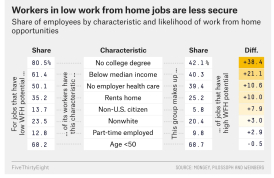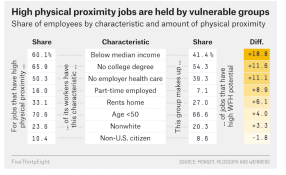From David Ruccio source When social solidarity is essential, it’s common to hear pious sermons against class warfare. Unfortunately, there is a class war. And its victims, so many of them front-line workers, didn’t start it. — E. J. Dionne Jr. New research confirms what we’ve all been seeing for the past couple of months: the lowest paid, most precarious workers are the ones who are being forced to face the choice between their jobs and their lives. And, looking forward, as those in charge push to reopen the economy, the most vulnerable workers are the ones who will most find themselves caught up in the ultimate dilemma of capitalist employment during the COVID-19 pandemic: stay at home without the ability to earn a paycheck or go back to work and increase the chance of getting the
Topics:
David F. Ruccio considers the following as important: Uncategorized
This could be interesting, too:
tom writes The Ukraine war and Europe’s deepening march of folly
Stavros Mavroudeas writes CfP of Marxist Macroeconomic Modelling workgroup – 18th WAPE Forum, Istanbul August 6-8, 2025
Lars Pålsson Syll writes The pretence-of-knowledge syndrome
Dean Baker writes Crypto and Donald Trump’s strategic baseball card reserve
from David Ruccio
When social solidarity is essential, it’s common to hear pious sermons against class warfare. Unfortunately, there is a class war. And its victims, so many of them front-line workers, didn’t start it. — E. J. Dionne Jr.
New research confirms what we’ve all been seeing for the past couple of months: the lowest paid, most precarious workers are the ones who are being forced to face the choice between their jobs and their lives.
And, looking forward, as those in charge push to reopen the economy, the most vulnerable workers are the ones who will most find themselves caught up in the ultimate dilemma of capitalist employment during the COVID-19 pandemic: stay at home without the ability to earn a paycheck or go back to work and increase the chance of getting the dreaded disease.
A new working paper by Simon Mongey, Laura Pilossoph, and Alex Weinberg explains why. Workers in low-work-from-home jobs (the chart above on the left) or high-physical-proximity jobs (the chart on the right) are more economically vulnerable: they are less educated, earn lower incomes, have fewer liquid assets relative to income, and are more likely renters.
Moreover, they found, those same workers (who, for example, lived in areas with less pre-virus employment in work-from-home jobs) saw smaller increases in the rates at which individuals were able to stay at home. At the same time, workers who were employed in occupations with low work-from-home scores experienced larger employment losses.
In recent months, then, workers at the bottom of the economic pyramid were more likely to be either laid off and forced onto the ever-lengthening unemployment lines or required to continue to labor under perilous conditions because their jobs didn’t allow them to work from home.
Now, as their employers attempt to reopen their businesses, many vulnerable workers will lose their unemployment compensation. Therefore, they will be forced to have the freedom to work not from home, but on-site, in close proximity to other workers and customers. That also means they’ll be closer to and caught within the cruel circuits of coronavirus contagion—thus imperiling themselves, their families, and their communities.
The authors of the report succinctly and accurately characterize the cruel dilemma created by American capitalism in the age of the pandemic in the following manner:
Already more economically vulnerable workers are disproportionately exposed to unemployment now, and infection in the future.


